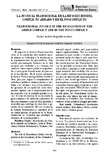| dc.rights.license | http://creativecommons.org/licenses/by-nc-sa/3.0/ve/ | es_VE |
| dc.contributor.author | Rojas Benavides, Rafael Andrés | |
| dc.date.accessioned | 2020-08-11T01:53:42Z | |
| dc.date.available | 2020-08-11T01:53:42Z | |
| dc.date.issued | 2020-08-10 | |
| dc.identifier.issn | 1690-3544 | es |
| dc.identifier.uri | http://www.saber.ula.ve/handle/123456789/46966 | |
| dc.description.abstract | El papel de la Justicia Transicional fue clave en la resolución del conflicto armado interno en Colombia y la incidencia en la implementación del posconflicto. Esto resalta este momento histórico en la vida nacional que visibiliza a las víctimas del conflicto como sujetos políticos empoderados y principales beneficiarios del proceso de reconciliación. En la actual coyuntura, la Justicia Transicional posibilita revertir el Statu Quo para lograr el cumplimiento de estándares jurídicos internacionales y visibiliza a las víctimas. Así, el Posconflicto y las garantías de no repetición están directamente ligados con la implementación de los acuerdos y de la voluntad política y social. Se trata de transitar de un escenario de guerra interna y de violación sistemática de derechos humanos a uno de PAZ duradera y sostenible que satisfaga los derechos y garantías de no repetición. En este escenario, la Justicia Transicional se convierte en el eje donde gravita el quehacer de la democratización en Colombia que erradique la violencia de la lucha política. | es_VE |
| dc.language.iso | es | es_VE |
| dc.rights | info:eu-repo/semantics/openAccess | es_VE |
| dc.subject | Resolución del Conflicto armado en Colombia | es_VE |
| dc.subject | Justicia Transicional | es_VE |
| dc.subject | Justicia Restaurativa | es_VE |
| dc.subject | Victimas | es_VE |
| dc.subject | Paz | es_VE |
| dc.title | La justicia transicional en la resolución del conflicto armado y en el posconflicto | es_VE |
| dc.title.alternative | Transitional justice in the resolution of the armed conflict and in the post-conflict | es_VE |
| dc.type | info:eu-repo/semantics/article | es_VE |
| dcterms.dateAccepted | 19/10/2019 | es |
| dcterms.dateSubmitted | 07/07/2019 | es |
| dc.description.abstract1 | The role of Transitional Justice was important in the resolution of the Colombia’s internal armed conflict and post-conflict impact implementation. This is a historical moment because conflict´s victims are empowered political subjects and main beneficiaries of the reconciliation process. At the current juncture, the Transitional Justice can be possible to reverse the Statu Quo and achieve compliance with international legal standards and visibility for victims. Post-conflict and non-repetition guarantees are directly linked to the implementation of political and social agreements. It means moving from a scenario of internal war and systematic human rights violation to a lasting and sustainable PEACE that satisfies the rights and guarantees of non-repetition. In this point, the Transitional Justice becomes the axis where the task of democratization in Colombia that eradicates the violence of the political struggle gravitates. | es_VE |
| dc.description.colacion | 188-202 | es_VE |
| dc.description.email | rascuaran25@hotmail.com | es_VE |
| dc.description.frecuencia | Anual | es |
| dc.identifier.depositolegal | 2002TA1412 | es |
| dc.publisher.pais | Venezuela | es_VE |
| dc.subject.facultad | Núcleo Táchira (NUTULA) | es_VE |
| dc.subject.institucion | Universidad de Los Andes | es_VE |
| dc.subject.keywords | Colombian’s resolutions armed conflict | es_VE |
| dc.subject.keywords | Transitional Justice | es_VE |
| dc.subject.keywords | restorative Justice | es_VE |
| dc.subject.keywords | victims | es_VE |
| dc.subject.keywords | peace | es_VE |
| dc.subject.seccion | Heurística: Artículos | es_VE |
| dc.subject.thematiccategory | Ciencias Económicas y Sociales | es_VE |
| dc.subject.tipo | Revistas | es_VE |
| dc.subject.unidadinv | Grupo de Investigación de Historia de la Educación y Representaciones (HEDURE) | es_VE |
| dc.type.media | Texto | es_VE |


